
Find The Best Dermatologist Doctor Near You
Your Skin Deserves Expert Care. Experience Excellence Today!
Dermatologists provide personalized care designed to address the unique needs of every patient. With years of medical training and hands-on experience, they are skilled in treating a wide range of skin concerns, from common conditions like acne and eczema to more serious issues such as skin cancer. Healthy skin is an essential part of overall well-being, and today’s dermatologists are committed to creating welcoming, professional environments where patients feel comfortable discussing their skincare concerns and goals.
Advanced Treatments with a Personalized Approach
Dermatologists use the latest technology and proven techniques to deliver treatments that are both effective and designed for long-lasting results. Because every patient’s skin is different, dermatologists take the time to carefully assess individual concerns and develop custom treatment plans tailored to each person’s needs. From preventive care and cosmetic procedures to advanced medical solutions, patients can rely on skilled dermatologists to provide expert guidance at every step. The goal is simple: to help each patient achieve healthy, beautiful skin that supports overall confidence and well-being.
Expert Care for All Your Skin Needs


What is Dermatology
Dermatology is a branch of medicine focused on the health of the skin, hair, nails, and mucous membranes. It covers a wide range of concerns, from common conditions such as acne, eczema, and psoriasis to more serious issues like skin cancer and autoimmune disorders. Dermatologists undergo extensive training in skin anatomy and disease, giving them the expertise to provide accurate diagnoses and effective treatment options.
In addition to medical care, dermatology also includes cosmetic treatments that enhance the skin’s appearance and overall health. Many people seek dermatologists for concerns like wrinkles, sun damage, or uneven skin tone. Options may include chemical peels, laser therapies, or injectables such as Botox and dermal fillers, all performed with an emphasis on both safety and natural-looking results.
Preventive care is another vital part of dermatology. Regular skin exams help detect early signs of skin cancer and other conditions, while dermatologists also guide patients on sun protection, skincare routines, and healthy lifestyle choices that support skin health.
By blending medical expertise with cosmetic treatments and preventive care, dermatology plays a key role in improving both skin health and quality of life.
Acne Treatment
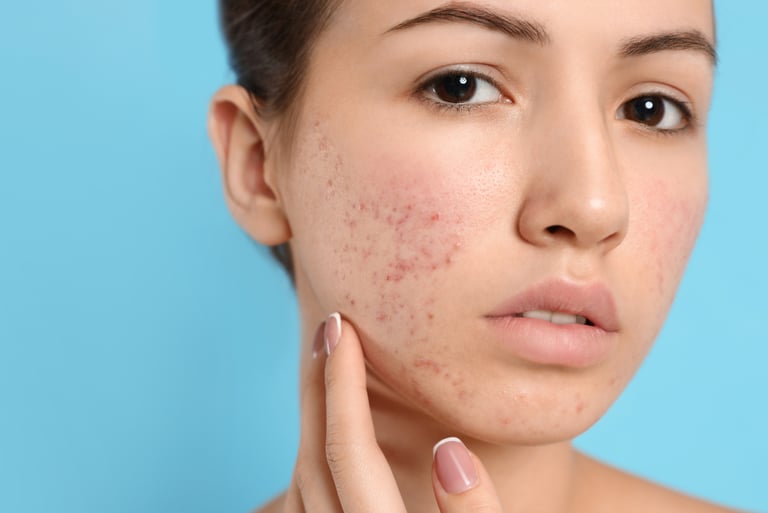

Dermatologists provide tailored care for managing acne, ranging from occasional breakouts to more severe cases. Treatment options may include prescription medications, customized skincare routines, and in-office procedures designed to promote clearer, healthier skin.
Dermatology Services


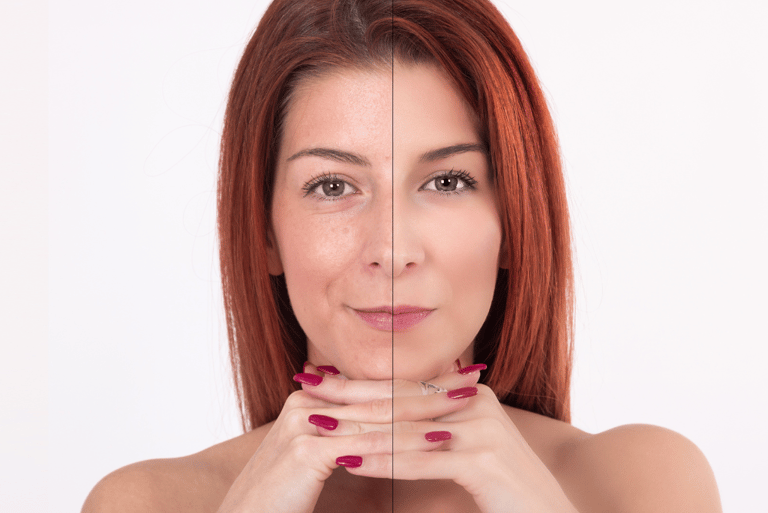

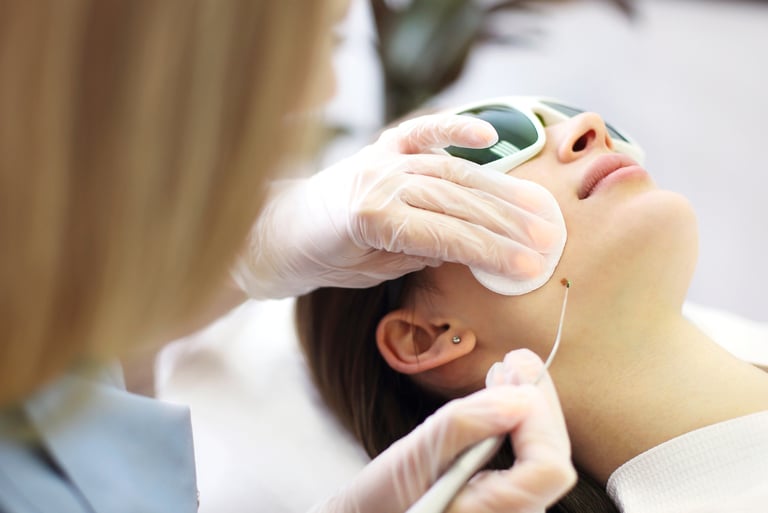

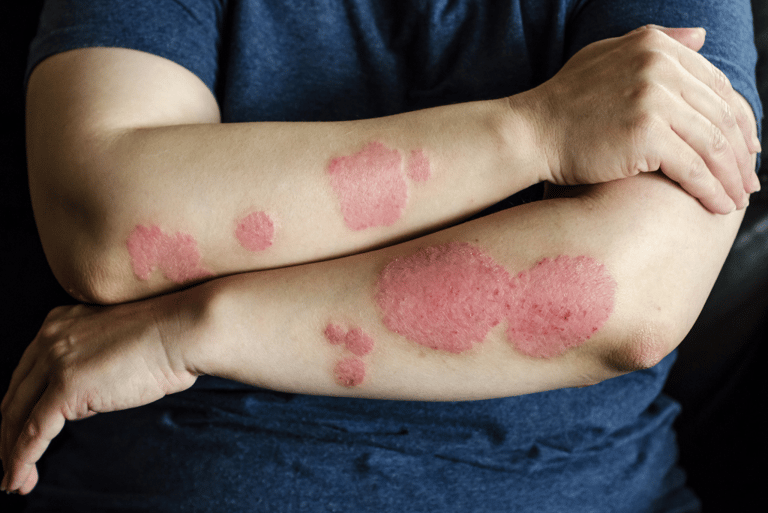

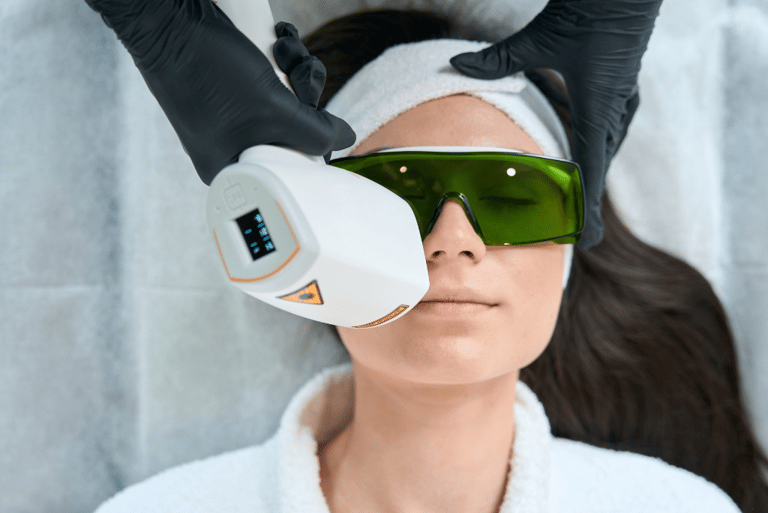

Skin Cancer Screenings and Treatment
Anti-Aging Treatments
Mole and Skin Tag Removal
Eczema and Psoriasis Management
Laser Hair Removal
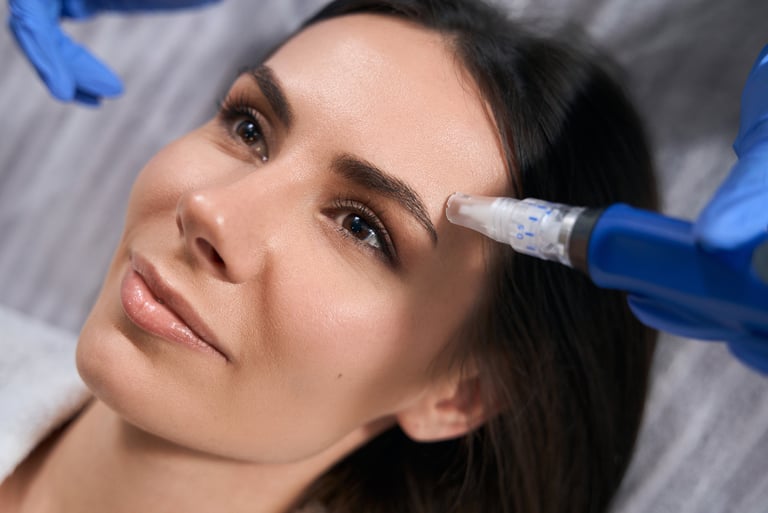

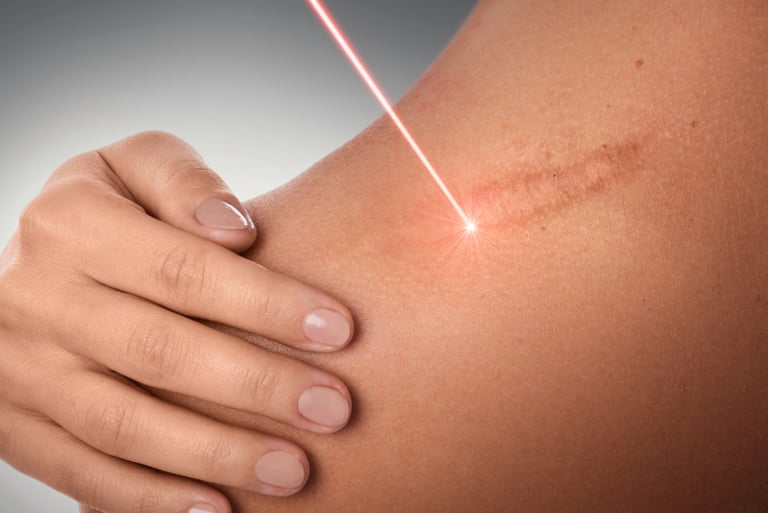

Microneedling
Rosacea Treatment
Scar Revision and Treatment
Regular skin cancer screenings are an essential part of preventive care, helping detect changes early when treatment is most effective. Dermatologists perform thorough skin examinations and, when necessary, provide advanced treatment options such as surgical excision or Mohs micrographic surgery to remove cancerous lesions safely and effectively.
Dermatologists offer a variety of anti-aging treatments designed to smooth wrinkles, restore lost volume, and improve skin tone. Options may include Botox, dermal fillers, chemical peels, and other cosmetic procedures that help revitalize the skin for a more youthful, refreshed appearance.
Dermatologists provide safe, minimally invasive options for removing unwanted moles and skin tags. Removal may be recommended for cosmetic reasons or when further evaluation is needed for medical concerns. These procedures are designed to be effective while keeping patient comfort in mind.
Dermatologists help patients manage chronic skin conditions such as eczema and psoriasis with personalized treatment plans. Options may include advanced medications, topical therapies, and light therapy designed to reduce symptoms, prevent flare-ups, and support long-term skin health.
Laser hair removal is a popular procedure that provides long-lasting reduction of unwanted hair. Commonly performed on areas such as the face, legs, and underarms, the treatment targets hair follicles with precision to deliver safe, effective results and smoother skin over time.
Microneedling is a minimally invasive procedure that improves skin texture and stimulates collagen production. It is commonly recommended to help reduce the appearance of scars, fine lines, and enlarged pores, making it a popular option for skin rejuvenation and a smoother, more refreshed complexion.
Dermatologists offer treatment options to help manage rosacea, a common skin condition that causes facial redness and visible blood vessels. Care may include prescription medications and advanced laser therapies designed to reduce redness, minimize flare-ups, and improve overall skin tone.
Dermatologists use a variety of techniques to improve the appearance of scars caused by acne, surgery, or injury. Treatment options may include microneedling, laser therapy, or surgical procedures, depending on the type and severity of the scar. These approaches are designed to create smoother, more even skin texture and enhance overall appearance.
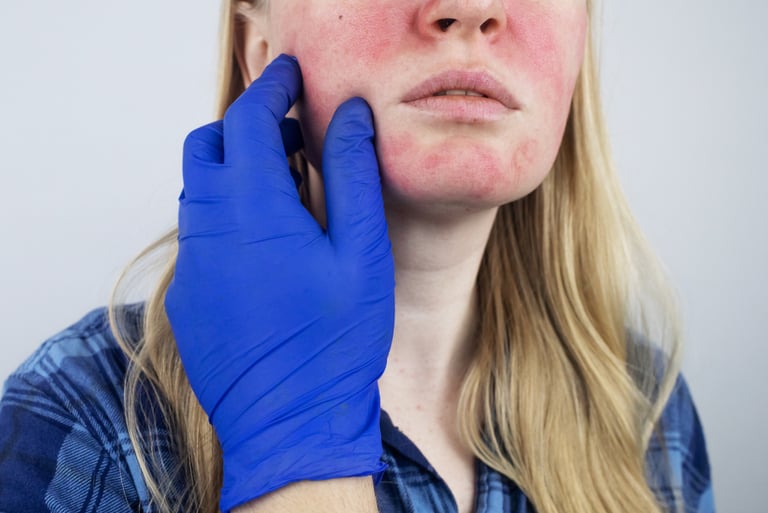

Most Common Skin Conditions


Skin conditions vary widely in their causes and effects, often impacting not only appearance but also overall well-being. Below are some of the most common concerns dermatologists treat, along with insight into their symptoms and available treatment options.
Acne
Acne is one of the most widespread skin conditions, affecting people of all ages but especially teenagers and young adults. It develops when hair follicles become clogged with oil, dead skin cells, and bacteria, resulting in breakouts, blackheads, and sometimes painful cysts. Treatment options may include topical creams, oral medications, and advanced therapies such as chemical peels or laser treatments, all designed to reduce inflammation, clear clogged pores, and promote healthier skin.
Eczema
Eczema, also known as atopic dermatitis, is a chronic skin condition marked by dryness, itching, and inflammation. It often appears in childhood but can continue into adulthood. Common triggers include allergens, irritants, and even stress. Dermatologists typically recommend a combination of moisturizing treatments, topical corticosteroids, and lifestyle adjustments to help manage flare-ups and strengthen the skin’s natural barrier.
Psoriasis
Psoriasis is an autoimmune condition that causes skin cells to multiply more rapidly than normal, leading to thick, red patches covered with silvery scales. It can develop on many areas of the body and, in some cases, is linked with joint pain. Treatments may include topical creams, light therapy (phototherapy), or systemic medications designed to slow cell growth, reduce inflammation, and improve overall skin appearance.
Rosacea
Rosacea is a common inflammatory skin condition that often appears as facial redness, visible blood vessels, and, in some cases, acne-like bumps. It most commonly affects adults and may be triggered by factors such as sun exposure, hot foods, alcohol, or stress. While rosacea cannot be cured, dermatologists can help manage symptoms through topical and oral medications, as well as laser therapies designed to reduce redness and minimize flare-ups.
Skin Cancer
Skin cancer is a serious condition that develops when abnormal skin cells grow uncontrollably, often due to excessive sun exposure or genetic risk factors. The three most common types are basal cell carcinoma, squamous cell carcinoma, and melanoma. Because early detection is critical for successful treatment, dermatologists recommend regular skin examinations. Treatment options may include surgical procedures, cryotherapy, topical medications, or advanced therapies depending on the type and stage of the cancer.
Moles and Skin Tags
Moles and skin tags are common benign growths that can appear on various areas of the skin. While most are harmless, some may be removed for cosmetic reasons or evaluated further to rule out potential concerns. Dermatologists offer safe and effective removal options, helping patients address these growths with confidence and comfort.
Understanding these common skin conditions is an important step toward effective management and treatment. Dermatologists provide professional guidance, personalized care, and a wide range of treatment options to support healthier, clearer skin.
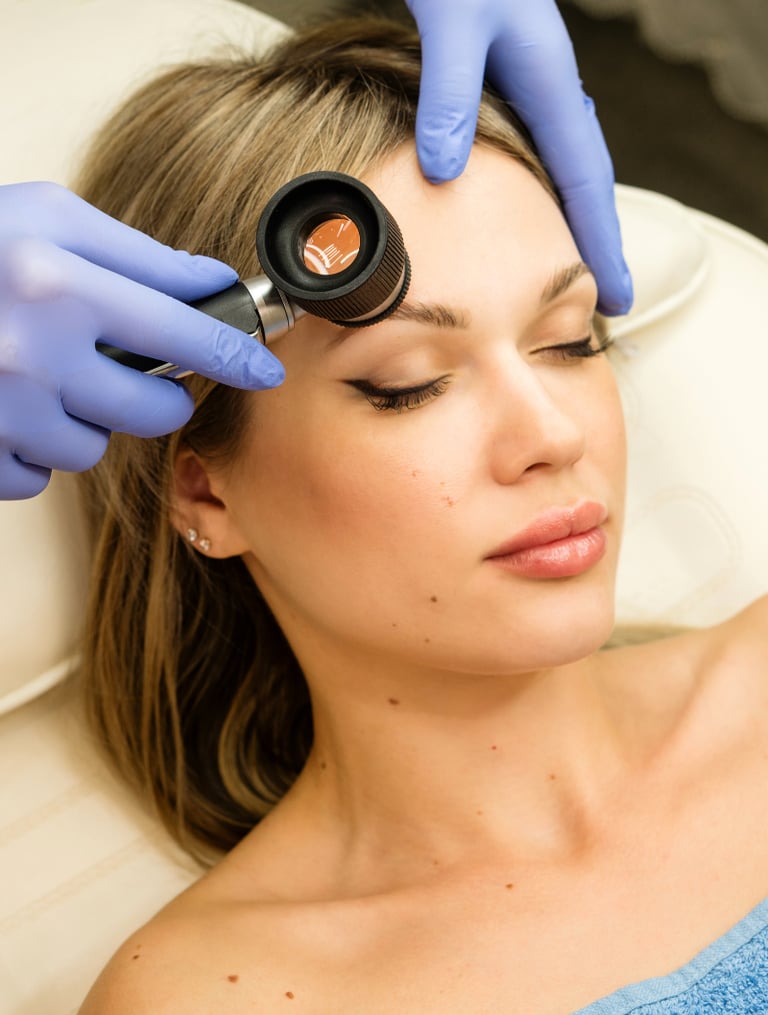

Popular Dermatology Treatments
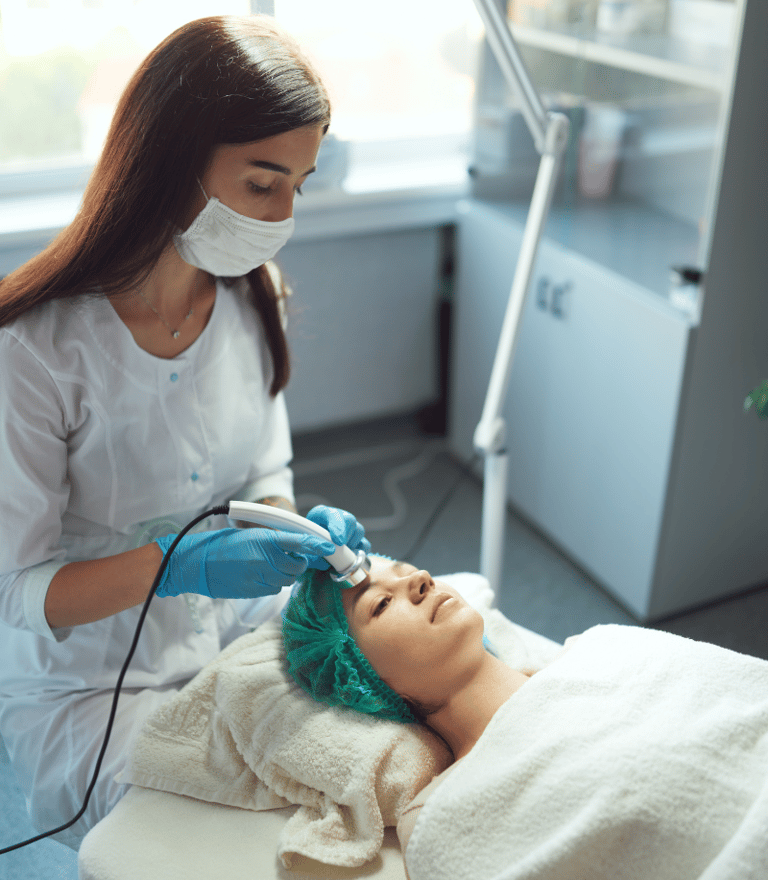

Dermatologists offer a wide variety of treatments to address skin conditions and support long-term skin health. Care is tailored to each patient’s unique needs and goals, ensuring treatments are both effective and safe. Below are some of the most common dermatology treatments available today:
Acne Treatment
Acne treatment plans often combine advanced techniques and medical-grade products to help clear and improve the skin. Depending on the severity of the condition, dermatologists may recommend topical or oral medications, along with in-office procedures such as chemical peels or laser therapy. These treatments are designed to reduce inflammation, prevent future breakouts, and promote clearer, healthier-looking skin.
Laser Hair Removal
Laser hair removal is a popular cosmetic treatment that offers long-lasting reduction of unwanted hair. The procedure works by precisely targeting hair follicles with concentrated light energy, making it a safe and effective option for areas such as the face, legs, underarms, and more. Modern laser technology is designed to minimize discomfort while providing smooth, lasting results.
Microneedling
Microneedling is an advanced procedure used to improve skin texture and stimulate collagen production. This minimally invasive treatment creates tiny micro-injuries in the skin, which activate the body’s natural healing process. It is commonly recommended to reduce the appearance of acne scars, fine lines, and enlarged pores, leaving the skin smoother and more youthful over time.
Chemical Peels
Chemical peels are treatments that exfoliate and rejuvenate the skin by removing damaged outer layers. They can help improve skin tone, soften fine lines, and minimize blemishes or discoloration. Dermatologists select the type and strength of peel based on each patient’s skin type and concerns, ensuring safe application and effective results.
Botox and Dermal Fillers
Botox and dermal fillers are popular cosmetic treatments designed to address common signs of aging. Botox works by temporarily relaxing facial muscles to soften the appearance of wrinkles and fine lines. Dermal fillers restore volume, smooth facial contours, and enhance natural features, creating a refreshed and more youthful look. Dermatologists carefully evaluate each patient’s goals to determine the most appropriate treatment plan for safe, effective results.
Skin Cancer Treatments
Dermatologists provide comprehensive care for patients with skin cancer, beginning with regular screenings and early detection. When treatment is required, options may include surgical excision, Mohs micrographic surgery, topical medications, or other advanced therapies based on the specific diagnosis. With timely intervention, dermatologists can help patients manage skin cancer effectively while supporting long-term skin health.
Eczema and Psoriasis Management
Managing chronic skin conditions such as eczema and psoriasis often requires a comprehensive, long-term approach. Dermatologists may recommend treatment plans that include topical or oral medications, light therapy, and lifestyle adjustments to help relieve symptoms, reduce flare-ups, and improve overall skin health.
These common dermatology treatments highlight the wide range of options available for patients seeking healthier skin. Dermatologists provide professional guidance, answer questions, and recommend treatments tailored to each individual’s needs, whether for medical care or cosmetic improvement.
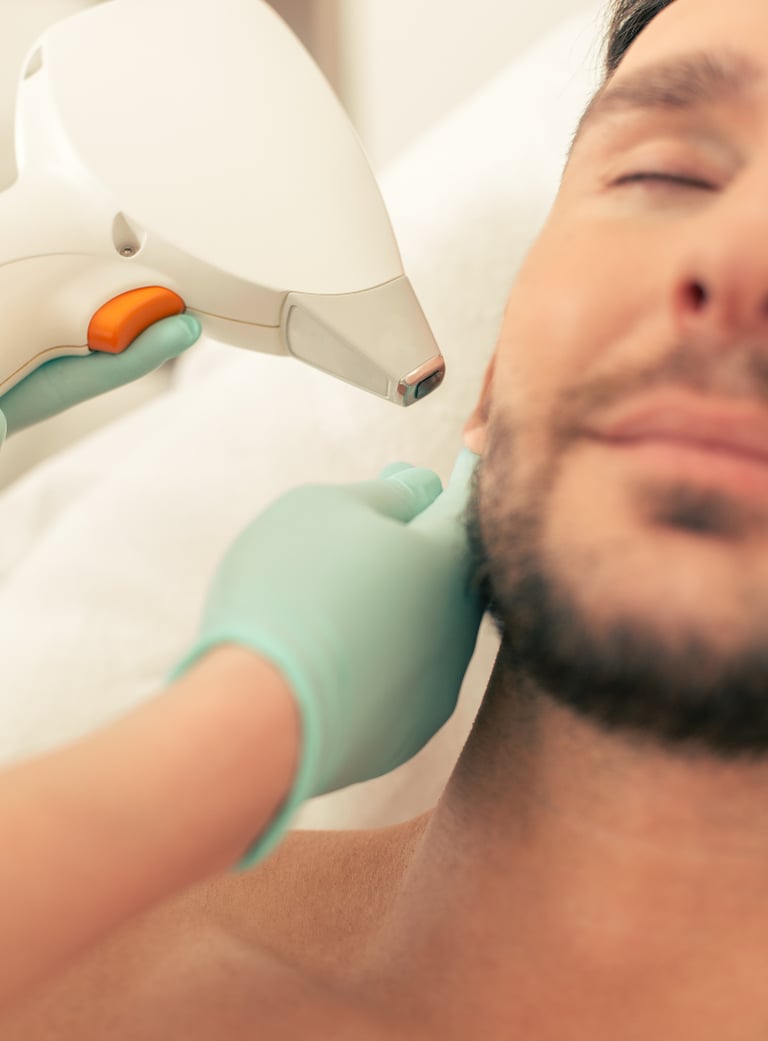

How to Choose the Right Dermatologist


Selecting the right dermatologist is an important step toward achieving your skincare goals and maintaining long-term skin health. With many options to consider, it helps to focus on a few key factors that can guide your decision and ensure you receive the best possible care.
Credentials and Experience
When choosing a dermatologist, it’s important to review their qualifications, including medical education, board certification, and any advanced training in specific areas of dermatology. Experienced dermatologists bring valuable knowledge in diagnosing and treating a wide range of skin conditions, as well as performing cosmetic procedures. Patients may also want to ask about a dermatologist’s experience with particular treatments they are considering to ensure the best results.
Areas of Specialization
Dermatology covers many specialties, ranging from medical care to cosmetic and surgical treatments. Depending on individual needs, whether managing a chronic condition like acne or psoriasis, or pursuing cosmetic options such as Botox or fillers, it is best to select a dermatologist with expertise in that area. Choosing a specialist helps ensure care is tailored to each patient’s unique concerns.
Patient Reviews and Recommendations
Patient reviews can offer valuable insight into a dermatologist’s practice, providing real perspectives on treatment outcomes, communication, and quality of care. Testimonials often highlight what patients appreciated most, from successful results to overall experience. In addition, recommendations from trusted sources, such as friends, family members, or a primary care physician, can help identify dermatologists with a strong reputation in the community.
Communication Style
Clear communication and patient education are essential parts of quality dermatology care. During an initial visit, pay attention to whether the dermatologist listens carefully to concerns, answers questions thoroughly, and explains treatment options in an understandable way. A strong doctor-patient relationship built on trust and open communication helps ensure the best care and supports positive treatment outcomes.
Office Environment and Staff
The atmosphere of a dermatology office can have a big impact on the overall patient experience. Cleanliness, organization, and professionalism are important factors to consider, along with how welcoming and supportive the staff is. A positive environment helps patients feel more comfortable, while attentive staff can make a visit smoother by addressing questions and concerns promptly.
Accessibility and Convenience
Practical considerations such as the clinic’s location, ease of scheduling, and insurance acceptance also play a role in choosing the right dermatologist. A conveniently located office with flexible appointment times makes it easier for patients to keep up with regular visits and follow-up care.
By keeping these factors in mind, patients can feel more confident when selecting a dermatologist who meets their needs and supports long-term skin health.


Skin Care Tips and Advice


Taking care of your skin is an ongoing process that requires the right routine and consistent attention. The following practical tips can help support healthy, radiant skin and reduce the risk of common concerns.
Clean and Moisturize
Regular cleansing is important for removing dirt, oil, and buildup that can clog pores and lead to breakouts. A gentle cleanser suited to your skin type is best, followed by a moisturizer to lock in hydration. Moisturizing is especially important for those with dry or sensitive skin, as it helps maintain the skin’s natural barrier.
Protect Your Skin from the Sun
Sun protection is one of the most effective ways to prevent skin damage and lower the risk of skin cancer. Apply a broad-spectrum sunscreen with SPF 30 or higher every day, even on cloudy days, and reapply every two hours, particularly after swimming or sweating. Additional measures such as wearing protective clothing and seeking shade during peak sun hours can also help safeguard skin health.
Eat Well
Diet plays an important role in maintaining healthy skin. A balanced approach that includes fruits, vegetables, whole grains, and lean proteins can support overall skin function and appearance. Foods rich in antioxidants, as well as vitamins A, C, and E, may help reduce inflammation and promote healthier skin. Omega-3 fatty acids, commonly found in fish, flaxseeds, and walnuts, can also contribute to a more resilient skin barrier. Staying hydrated is equally important, drinking enough water helps keep skin firm, elastic, and properly nourished.
Avoid Smoking and Limit Alcohol Consumption
Lifestyle habits have a significant impact on skin health. Smoking accelerates the aging process by constricting blood vessels, which reduces oxygen and nutrient delivery to the skin, often leading to a dull, tired appearance. Excessive alcohol consumption can also take a toll, as it dehydrates the skin and may contribute to long-term damage. Limiting these habits can support healthier, more vibrant skin.
Be Mindful of Products
Selecting the right skincare products plays a major role in maintaining healthy skin. Non-comedogenic formulas are generally recommended, as they are less likely to clog pores. It is also important to avoid harsh ingredients that may cause irritation, especially for sensitive skin. For specific concerns such as acne, rosacea, or hyperpigmentation, dermatologists can recommend products that are safe and effective for individual needs.
Establish a Consistent Skincare Routine
Consistency is essential for achieving and maintaining results. A balanced daily routine often includes cleansing, moisturizing, and applying sun protection in the morning, followed by gentle cleansing and moisturizing in the evening. For added benefits, patients may incorporate targeted treatments such as serums, exfoliants, or spot treatments based on their unique skin concerns.
Schedule Regular Dermatology Check-ups
Routine visits to a dermatologist for skin examinations and consultations are an important part of preventive care. Regular check-ups can help detect changes in the skin early, allowing for timely treatment when necessary. Dermatologists can also provide personalized guidance on skincare routines and address specific concerns based on each patient’s needs.
By incorporating these skin care tips into daily life, patients can better protect and enhance their skin’s natural health. Healthy skin is closely connected to overall well-being, and dermatologists play a key role in offering expert advice, treatment options, and preventive care to support long-term results.
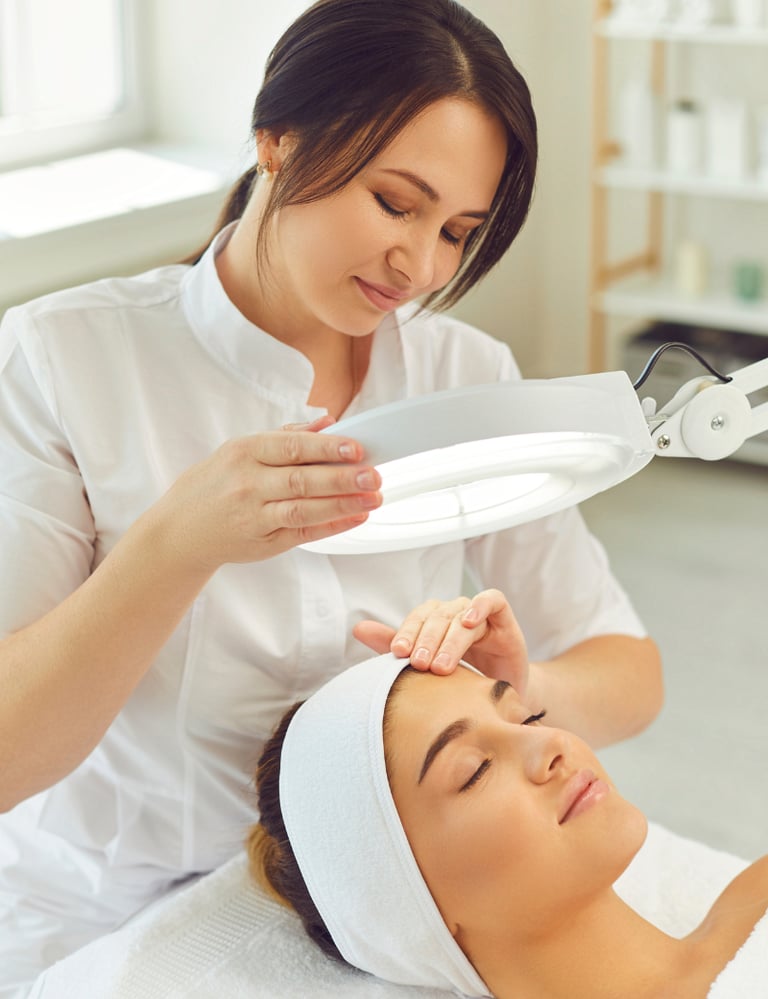

Contact a Dermatologist








